






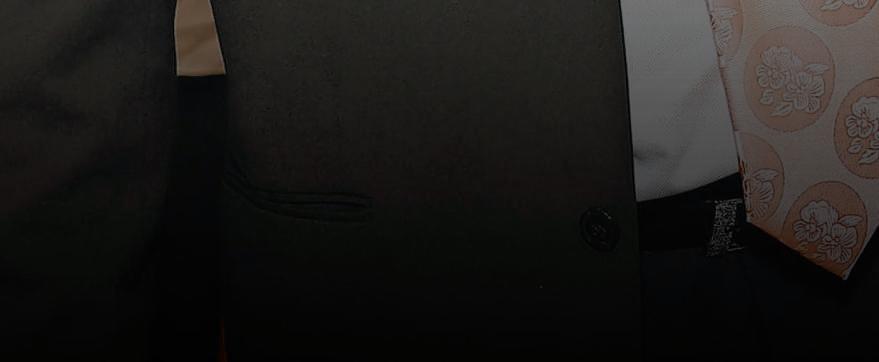









































Somewhere in the Bible, I believe it’s in the Gospel of the Big Payback, which theologians believe was written by Soul Bretheren Number One, the King James version reads, “If thou chooseth to dally, ye shall eventually discover.” The more modern Rick James version reads, “Mess around and fnd out if you want to,” which is exactly what a group of four-to-five white Alabama thugs did when they bumrushed (physically assaulted) an elderly brother Riverboat co-captain who was guilty of nothing more than reminding these boat-going heathens of docking rules. Tinking they had the “divine right” to mistreat this senior citizen any way they pleased, they chose to beat him into submission. But, as Rev. Brown from “Coming to America” reminds us, “Tere’s a God somewhere.” And that God sent a heavenly host of brothers, some by land, at least one by sea, to lay holy hands on those cowardly Philistines. But the miracles didn’t stop there. When Herod’s guards (i.e. 5-0) showed up, no brothers were killed. Plus, Black America has been showering these angels of God with manna from heaven (money) to cover whatever legal fees they may incur for standing against satan’s kingdom. Let the church say, Amen!
What do the start of the Haitian Revolution, the arrival of the frst acknowledged Africans to the Americas, the Watts Riot of ’65, Nat Turner’s Rebellion and the Ferguson Uprising afer the murder of Michael Brown have in common? Tey all took place in August. But the annual commemoration of Black August was founded by Black political prisoners, spurred by the assassination of revolutionary George Jackson by San Quentin prison guards (Aug 21, 1971). In protest, the brothers chose to fast and focus their
readings on the plights of oppressed people globally. Soon, the practice spread beyond prison walls, and has come to commemorate the long list of Black History moments that fall in August, including the births of Marcus Garvey (1887) and more. And this Black August, we commemorate the 60th anniversary of the March on Washington (Aug. 28, 1963). Te month is all about Black resistance and Black Power. Let our actions show it.
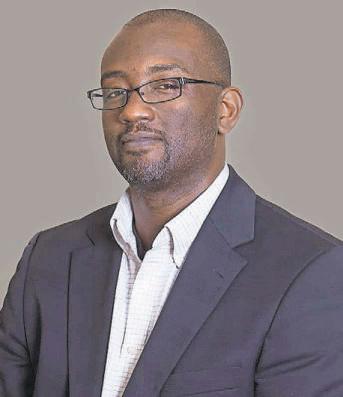
Tis month also marks the 58th anniversary of the 1965 Voting Rights Act. But this year marks the 158th anniversary of the original Voting Rights Act, the one passed by the 39th Congress (1865-1867). You read that right. Tese not-so-United States initially granted Blackfolk (Black men, specifcally) legal protections to vote not only via the 15th Amendment but the Voting Rights Act of 1865. But worshippers of the myth of white supremacy unleashed holy hell (torture, lynchings, domestic terrorism) upon Blacks who sought to exercise our rights. It took another 100 years before laws were passed (and actually enforced) allowing our electoral voices to be heard. But right now, the kin of those past lynch mobs are fghting to steal our voting power once again. Hell, Trump is facing federal charges as we speak for seeking to kill Black votes. So, this anniversary should be less about celebration and more about dedication… to protecting and exercising our right to vote.

• Jimmie’s Journey checks out Gospel Skate Night at Lockwood Palace
• Op-Ed: WWJD – Not convert libraries to jails
• How the Hollywood strike impacts Black creatives
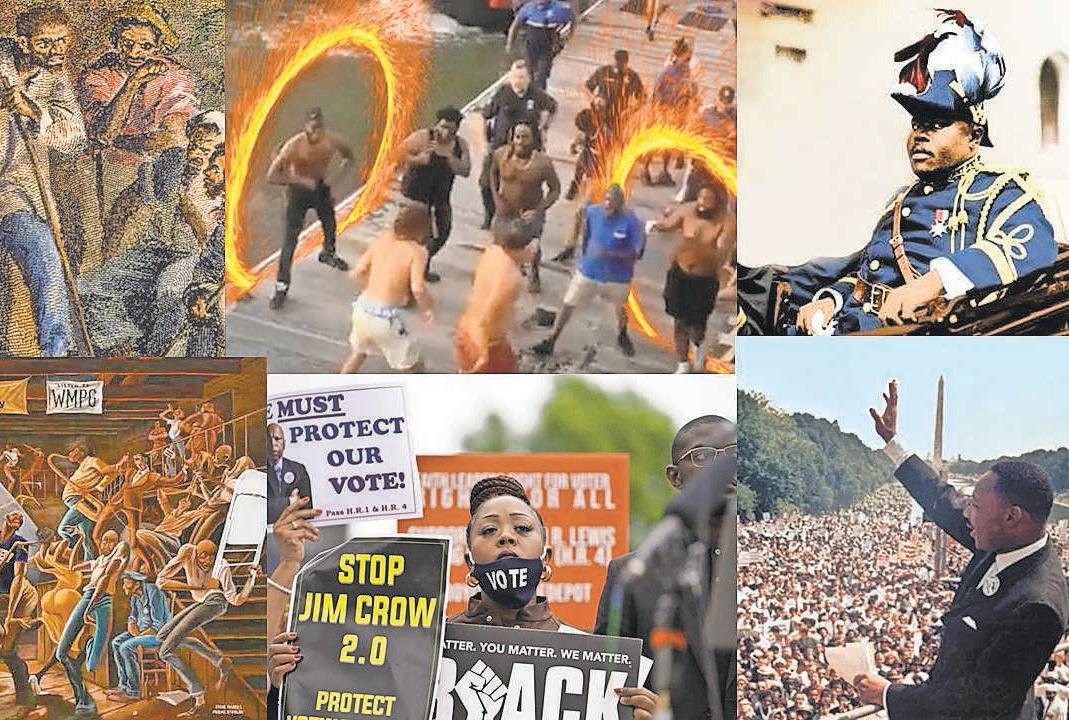
The families of 22 individuals who either died or sustained serious injuries while incarcerated in the Harris County Jail are seeking their day in court, as civil rights attorney Ben Crump and local attorney Paul Grinke filed a federal lawsuit against Harris County regarding its oversight, or lack thereof, of the jail.
The lawsuit contends the Sheriff’s Office, which oversees the jail, deliberately neglected its duty to keep incarcerated individuals safe, and that jail employees refused to provide medical care to individuals in need; some who ultimately died. The lawsuit also alleges many of the 22 individuals named in the lawsuit were assaulted and jail guards failed to stop violent attacks.
Crump said his office continues to receive calls from families with similar horror stories about the place several press conference attendees called the “House of Death.”
According to Crump’s team, most of these families still haven’t received word from the county on what they say happened, leaving their loved ones in the dark.
It is known, however, that nine of the 22 named plaintiffs died in custody while the remaining 13 endured a lack of access to medical care and/or severe beatings, leaving some
with broken necks requiring surgery.
“That is the very definition of cruel and unusual punishment,” said Crump, who was joined at the Aug. 7 press conference by several family members of the plaintiffs, including Jacilet Griffin-Lee, mother of Evan Lee who was murdered in the Harris County Jail on March 22, 2022, after he was beaten by another detainee and didn’t receive sufficient medical care, according to the lawsuit.
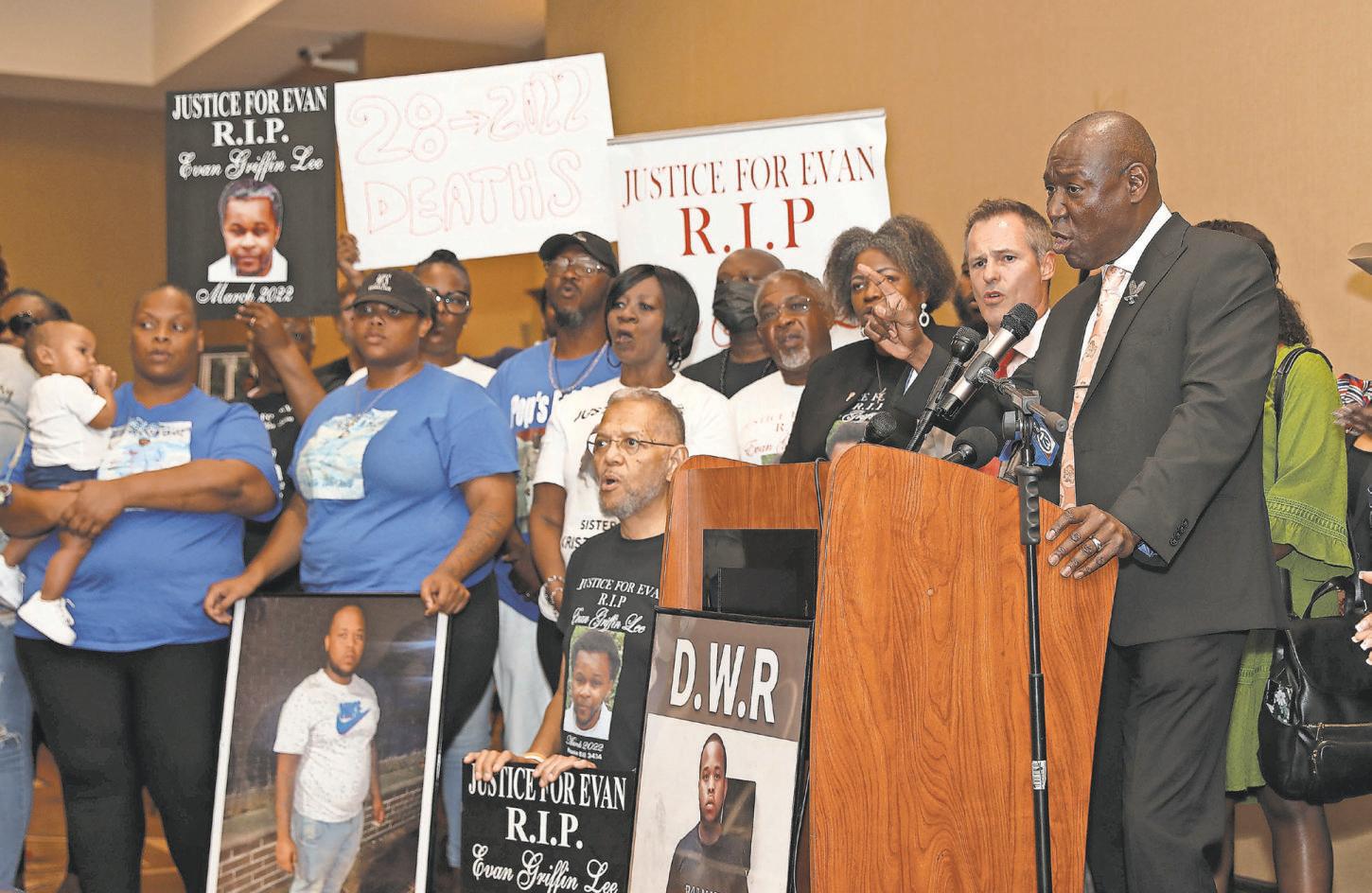
“This is why I spoke up; this is why I’ve made miles to
the Capitol,” said Griffin-Lee. “No one waiting their day in court deserves the death penalty. And zero transparency from the agency makes it worse.”
During the press conference State Rep. Ron Reynolds shared breaking news from Brandon Wood, executive director of the Texas Commission on Jail Standards (TCJS), that the County will now fall into the “escalated enforcement category” making the jail subject to additional on-site inspections and monthly progress reports required.
Calls were made for additional actions aimed at getting Superintendent Mike Miles’ plan reversed while a crowd of hundreds gathered in front of HISD’s Hattie Mae White Education Building on Aug. 5 to protest turning libraries in 28 predominantly Black schools into detention centers.

These actions include a Thursday, Aug. 8 “Read-In” at the Hattie Mae White Building beginning at 4p.m. followed by attendance at the HISD board meeting at 5:30p.m.
The rally, called for by NAACP Houston president Dr. James Dixon, brought together current and former HISD teachers and librarians, current and former HISD parents and students, and others who are against Miles’ library plan.
“The library is like a comfort place for
me,” said Taylor Hill, a Wheatley High School honor student. “I read every day; constantly. I feel like [Miles’ plan] is gonna hurt my education if I don’t have a library available to me.”
Speakers also made calls to take the fight to the ballot box.
“It’s time for us to put our foot down and let everyone in Austin know if you don’t do something, we are coming for you,” said Houston Federation of Teacher president Jackie Anderson.
County Commissioner Rodney Ellis also called for voter action, but added, “We gotta put pressure on people who are in power now.”
U.S. Rep. Al Green said Miles’ library plan would “voucherizing” schools and lead to a “return to segregation.”
At what point do we ring the alarm? At what point do we say that there’s an epidemic? At what point do we say enough is enough?”
BEN CRUMP Civil Rights Attorney
Te four Black mayors of the nation’s largest cities discussed big issues facing Black people. During the 2023 National Urban League Convention held in Houston, mayors Eric Adams (New York), Karen Bass (Los Angeles), Brandon Johnson (Chicago) and Sylvester Turner (Houston) discussed several topics facilitated by NUL President and CEO Marc Morial, the former mayor of New Orleans.
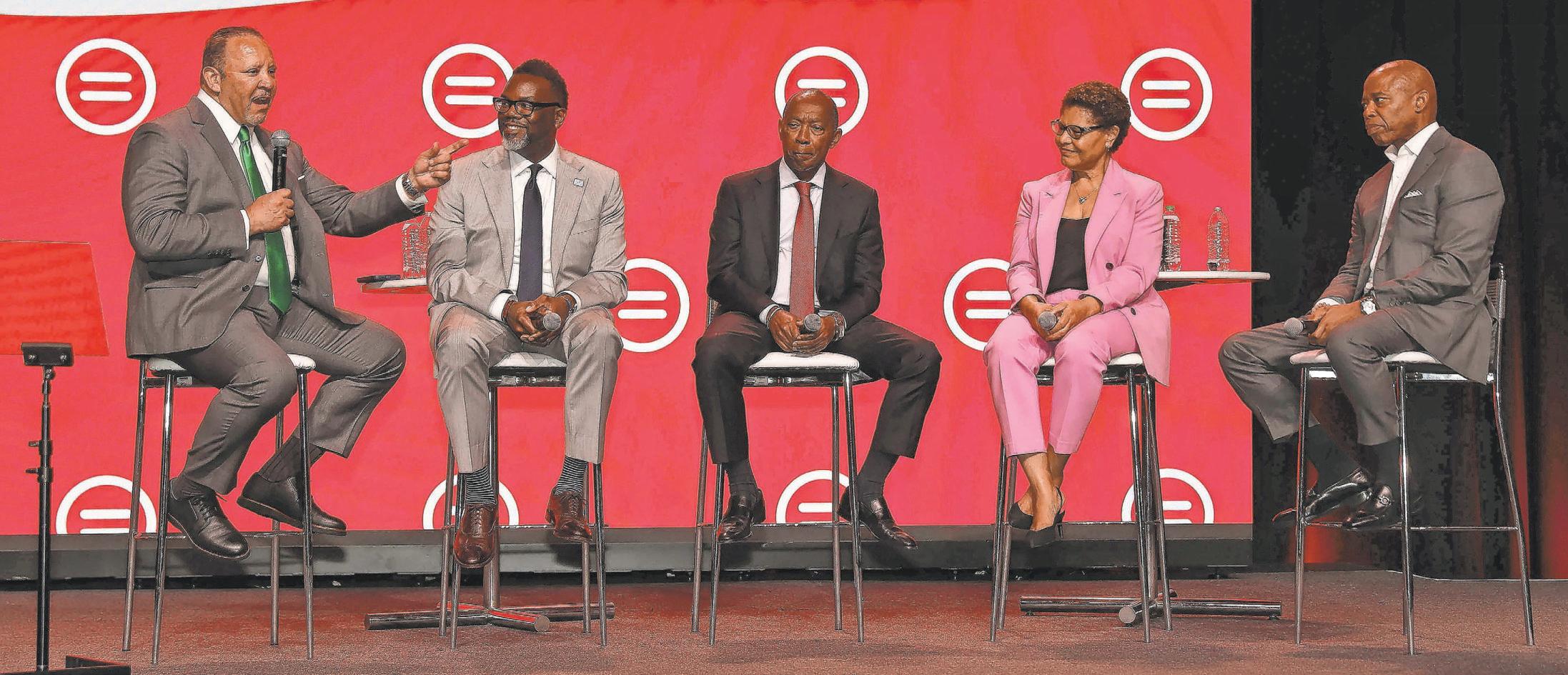
Here are excerpts from Part One of their conversation.
TURNER: In all of our cities, homicide rates are down despite what people are saying, what they’re hearing. Violence in our city is down. But I do recognize we can spit out the numbers and if people don’t feel safe, then they’re not safe. I got that. And as long as there’s one person being killed or one person being assaulted or one car getting broken in, it is one too many. So, we are investing in police. Tis whole story about cities not supporting police—BS. Yes, cities are supporting police, mayors are supporting police. We want the police to have what they need to solve the crimes, but we also recognize that we have to invest in communities that have been underserved for a long, long time.
ADAMS: What we must do is what Archbishop Desmond Tutu stated: “We spend a lifetime pulling people out of the river. No one goes upstream and prevents them from falling in, in the frst place.” Policing, by the time
See Part Two next week.
a child has a gun, we already lost… When I sit down with gang members and ask them, “How many of you are dealing with learning disabilities,” it’s astonishing. Tirty to 40% of the people who are in jail right now are dyslexic. I was on a path of doing the same things. If we don’t go upstream, while we deal with the crime downstream, let’s be clear, we can’t be just upstream, because Bey-Bey is creating some havoc right now in our streets. So, we have to identify the extreme recidivists, give them the assistance they need, but we have to stop pushing people in the river. Tat’s why we did 100,000 summer youth jobs. Tat’s why we did Summer Rising, so our children can be educated all school year long. Leaning into foster care children, paying for their college tuition, giving them stipends, making sure we do money for childcare.
BASS: I believe that in our communities, we’ve worked for years and know the strategy is to intervene and prevent crime. Tere’s always the rap that Black folks are upset if it’s a law enforcement involved death, but say nothing when it’s Black-on-Black, which I reject that notion. Tat is not true. But unfortunately, the grassroots work that happens in all of our communities is never lifed up, and we need to invest more in that… I think that sometimes Democrats in general are shy when it comes to the issue of crime and kind of go all around it. And when we do that, in my opinion, we concede the issue of crime to the Right Wing. And I don’t think that we should do that. I think we need to hit it head-on. If somebody commits a crime, you have to hold them accountable. But we also need to invest signifcant resources in the prevention of crime. I started an Ofce of Community Safety so that we could look at unarmed responses.
JOHNSON: In the nineties, in Chicago, there were almost 1,000 murders a year. Tis is not news to any of us… It’s gonna require a layered approach. In order to have better, stronger, safer cities, we have to invest in people. My father raised me with the understanding that your heart and treasure have to be aligned. Tat when you really love people, you invest in them… [However], there’s always been this battle or fght against liberation, particularly for Black folks because the power structure understands what works, because they want it for their communities.
VOLUME 92, NUMBER 39 - AUGUST 10, 2023
Publisher | CEO
Sonceria Messiah-Jiles
Strategic Alllance Clyde Jiles
Digital Content Manager Get Current Studios
Managing Editor ReShonda Tate
Associate Editor
Aswad Walker
Education Reporter Laura Onyeneho
Sports Terrance Harris
Jodie B. Jiles
Photographer
Jimmie Aggison
Social Media Manager
Tia Alphonse Jordan Hockett
used for nonrecurring closing costs including title insurance, recording fees, and in certain situations, discount points may be used to lower the interest rate. The grant cannot be applied toward down payment, prepaid items or recurring costs, such as property taxes and insurance. Borrowers cannot receive program funds as cash back.




3 Additional information about the Down Payment program: Down Payment program is available with one mortgage product. Program funds can be applied toward down payment only. Borrowers cannot receive program funds as cash back in excess of earnest money deposits. Down Payment Grant program may be considered taxable income, a 1099-MISC will
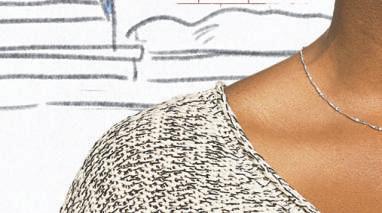




















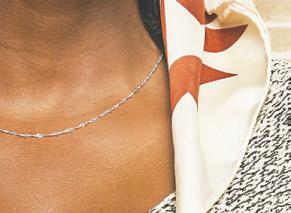




Melinda Spaulding Chevalier, an Emmy Award-winning communicator, brand strategist, crisis management expert and community afairs leader, has been named Rice University’s next vice president for public afairs. Spaulding Chevalier, who most recently served as vice president of communications and advancement at Texas Southern University and executive director of the TSU Foundation, will now lead eforts to elevate Rice’s visibility, reputation and relationships in Houston — statewide, nationally and internationally. Assuming the role Aug. 14, she will head the more than 35-member team that serves the university in various critical areas, including creative services, government relations, marketing and digital communications, multicultural community relations, news and media relations and university relations.
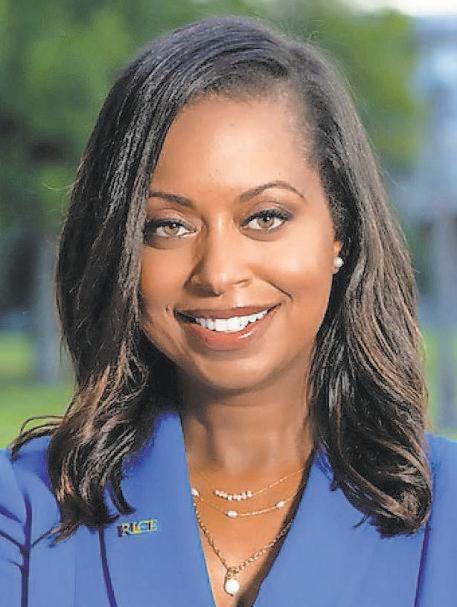
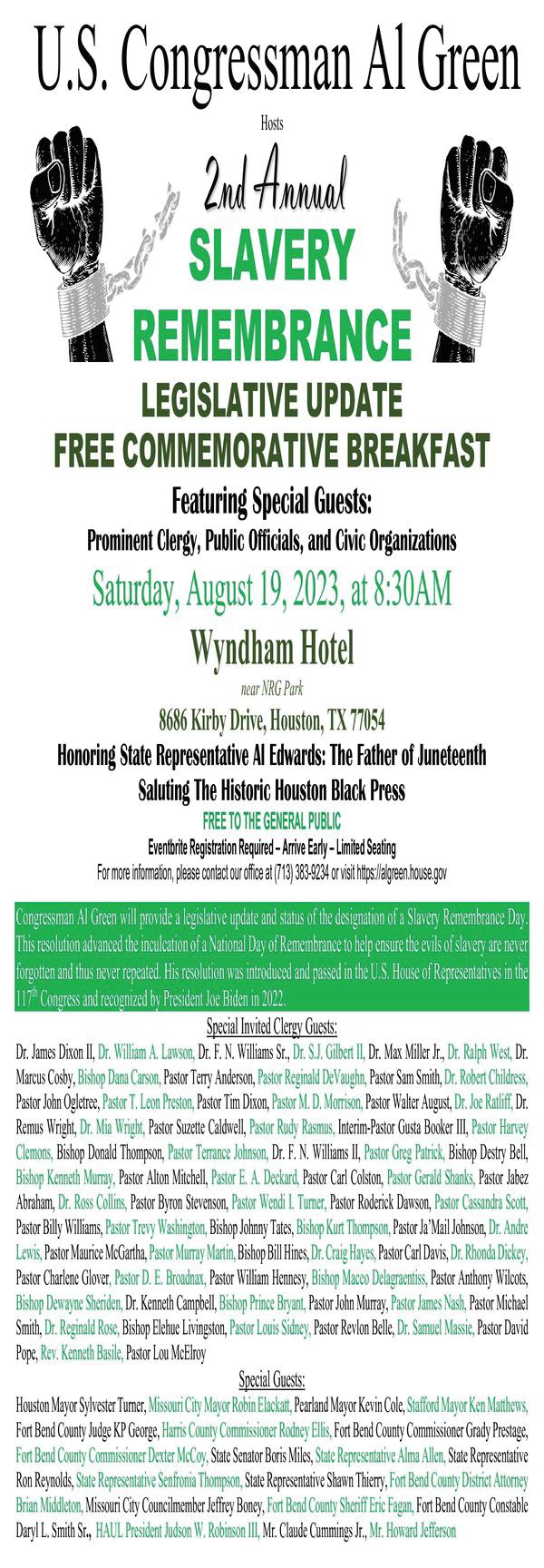
Dr. Ruth J. Simmons, professor, author, and president emerita of Prairie View A&M, Brown University, and Smith College, will deliver the 2023 Jeferson Lecture in the Humanities on September 26 at the Smithsonian National Museum of African American History and Culture. Simmons will deliver her lecture, “Facing History to Find a Better Future,” drawing on her more than 50 years’ experience as a scholar, pioneering academic administrator, and changemaker in higher education to highlight the role of the humanities in fostering socioeconomic mobility and cultural belonging. “One of our generation’s most important innovators in higher education, Ruth Simmons has advanced our understanding of the enduring legacy of enslavement across our most preeminent institutions and lifed up the under-told and underappreciated stories of our country’s history,” said NEH Chair Shelly C. Lowe (Navajo). Te lecture will stream online at neh.gov.
Dr. Kathleen McElroy, a Black journalism professor whose hiring was sabotaged by backlash over her past work promoting diversity, received a $1 million settlement recently from Texas A&M University. TAMU also apologized to her while admitting “mistakes were made during the hiring process.” Initially welcomed with great fanfare to revive its journalism department in June, McElroy’s TAMU job ofer of a tenure-track position was reduced to a one-year position from which she could be fred at any time. Te change came as a result of internal pushback from then-unidentifed hyper-conservative TAMU supporters displeased at McElroy’s past work improving diversity and inclusion in newsrooms. Shortly aferward, the university’s president Katherine Banks, who has since resigned, and a school dean began discussing reductions in McElroy’s job ofer. McElroy ultimately rejected the ofer
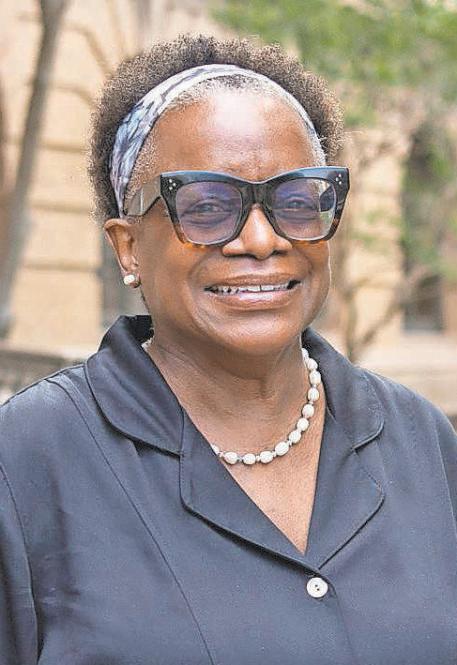


Located between the 610 Loop to the north and Interstate 10 (the East Freeway) to the southeast, the community of Pleasantville holds the distinction of being the first master-planned community in the U.S. created to house middle- and upper-income Blacks.
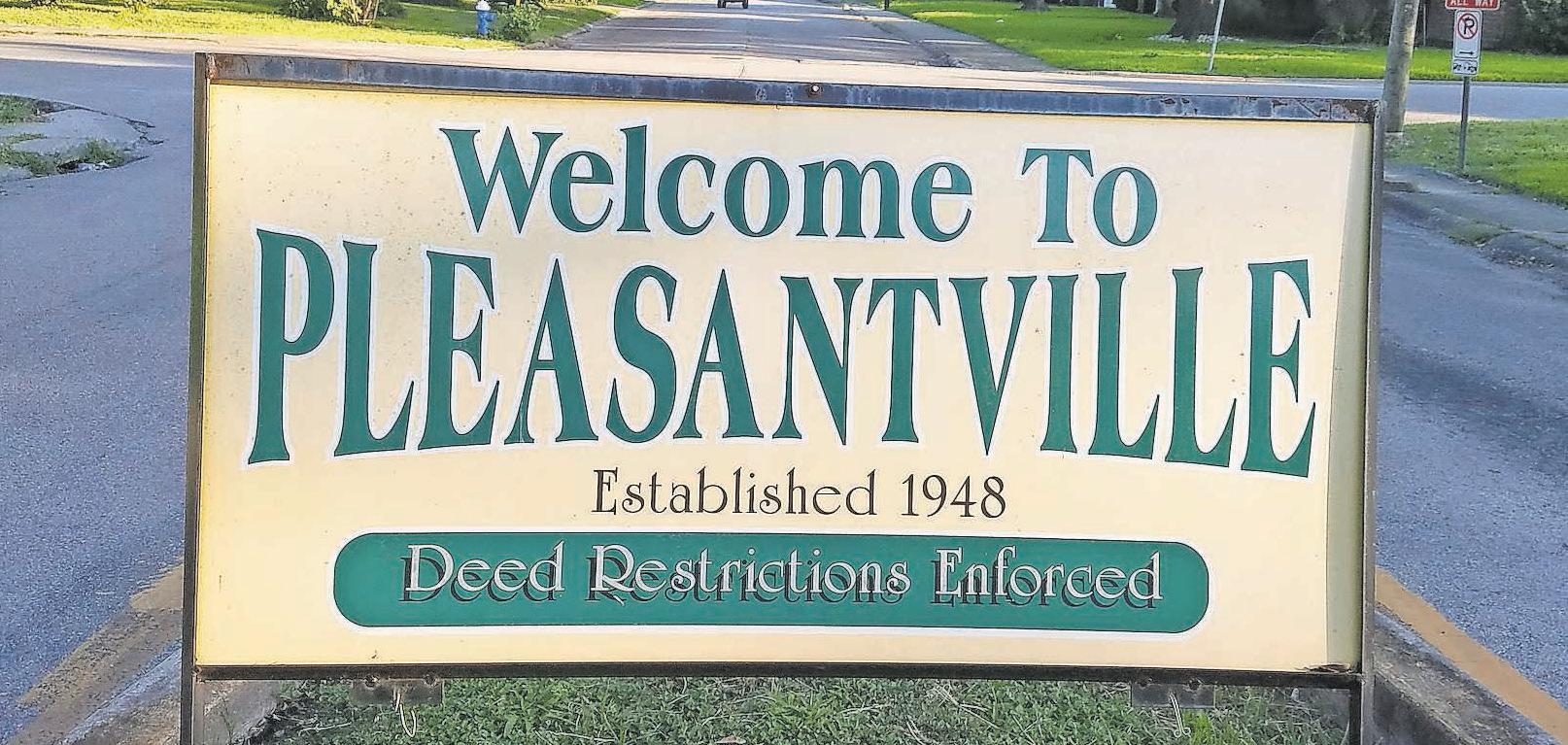
Residents also reportedly had the highest percentage of voter turnout in the state for multiple decades. And the community has produced some of Houston’s most impactful and influential leaders. We took a look at one of Houston most under-appreciated communities.
Pleasantville was officially founded in 1948, the year residents began moving in, though plans for the neighborhood were said to have hatched the previous year by two Houston Jewish builders and developers, Melvin A. Silverman and H.M. Cohen. The pair sought to create two Houston-area master-planned communities for World War II U.S. military veterans, one for Jewish-American vets and the other for Black servicemen.
Why? Because in 1940s Houston housing discrimination was in full effect for both groups.
“Though Silverman and Cohen are credited as the initial visionaries of the community, Pleasantville’s successful founding would not have occurred without the critical role played by African-American real estate agent and community leader Judson Robinson Sr,” said Mary Fontenot, a longtime Pleasantville resident and president of the Pleasantville Historical Society.
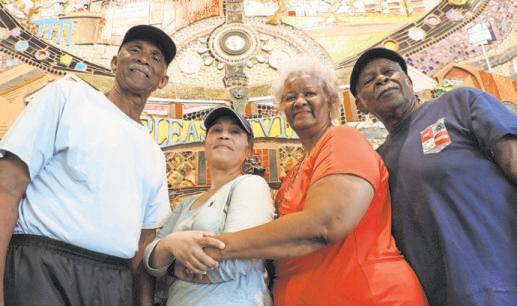
Robinson’s task: market Pleasantville to Black Houstonians, and sell them homes there.
“Silverman and Cohen went to the best realtor in Houston at that time, and that was Judson Robinson Sr. So really, if people learn the real story, they chose him; it was under his name. It was all about marketing and getting those houses to Black Americans.”
Fontenot added that Robinson’s wife, Josie, played a major, yet historically unsung role in Pleasantville’s founding, growth and success.
“But his wife Josie Robinson really had her hands in a lot of building and selling homes in Pleasantville, and a lot of people don’t know that. She was quiet but she was a darn good businesswoman.”
Using his contacts with Houston’s Black media, including African-American newspapers the “Houston Defender” and the “Informer” and later radio station KCOH, Robinson successfully inundated Black Houston with visions of a new kind of community for Black people.
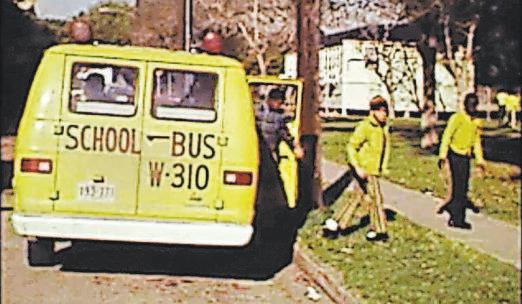
According to longtime resident Irma McGruder, “Pleasantville had been advertised across the city’s airwaves and the pages of the Black newspapers as the first of its kind in the nation—a ‘planned community of new homes, spacious and modern in design, and built specifically for the Negro families of means and class.’”
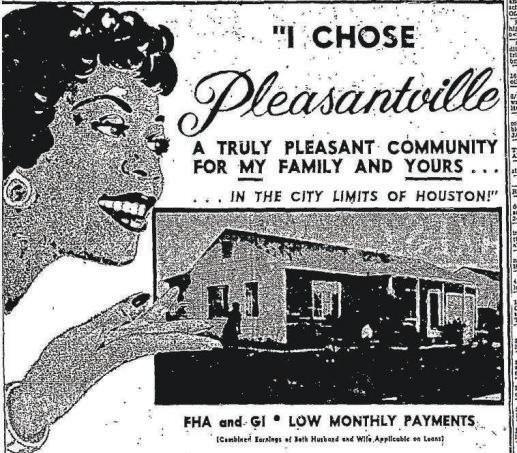
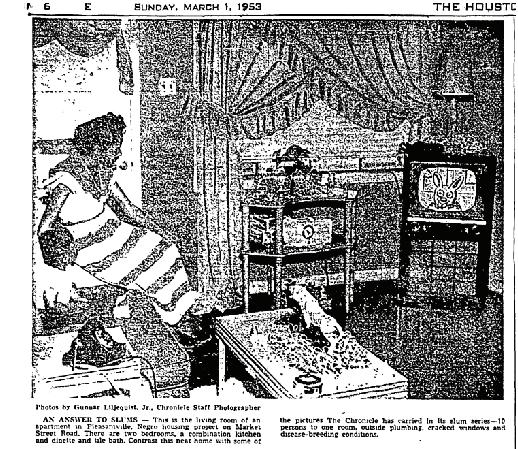
According to the TSU Urban Research and Resource Center (URRC), Pleasantville is part of the forgotten Civil Rights Movement of the 1940s. Pleasantville’s founding happened amid serious roadblocks to “life, liberty and the pursuit of happiness” for Blacks. These roadblocks included the vast majority of Black vets being denied access to earned G.I. Bill benefits; constant white domestic terrorism visited upon Blacks in general and Black military vets and entrepreneurs in particular, the lingering legacy of the convict leasing system and over-incarceration of Blacks and redlining (US government-backed housing discrimination).

Pleasantville residents fought the good fight by making excellence the standard.
“Seemed like everybody would set the bar high to (the point) you’d want to be on that bar,” said longtime Pleasantville resident Reverend Clinton Johns. “So, it was just an exhilarating feeling that you got. The pastors, Pastor [Hayward] Wiggins and Reverend King and the Methodist church and all the churches all bought into this.”
Pleasantville residents created a hub of Black excellence in several fields, becoming a magnet for the city’s and nation’s movers and shakers.
“Muhammad Ali, Joe Louis, Jesse Owens and Thurgood Marshall are just some of the historical figures who regularly visited Pleasantville, along with Pleasantville’s own activist, the late Carl Hampton, founder of the People’s Party II,” said Fontenot. And the activism wasn’t confined to Houston. One of Pleasantville’s religious leaders, Reverend Hayward Wiggins,

participated in the Summit of Black Religious Leaders on Apartheid (April 19, 1979, at the United Nations Church Center, New York, NY).
Pleasantville was so politically active and influential, the neighborhood’s nickname, “The Mighty 259th,” refers to its voter precinct. Houston native Attica Locke, TV/movie screenwriter and author of the Harper Lee Prize for Legal Fiction winning book “Pleasantville,” said, “Something happened when these developers created this neighborhood and they dropped in thousands of engaged, educated and moneyed Black folk: It changed state politics forever because when that neighborhood got its first elementary school, it got a place to vote. And suddenly they became this political powerhouse, and knew they were, and used that
power and have swung many an election.”

“Minnie Wallace who was one of the precinct chairs over here in Pleasantville was a very instrumental part in bringing Pleasantville to political iconic status,” said longtime resident Beverly Adams Demby during a 2018 interview. “Any politician that came to run for office, it was said, especially in the city, that you had to go through District B or Precinct 259 to get elected.”
Demby and husband, Judson Demby, added the biggest factor regarding Precinct 259’s record voter participation was Robinson Sr.’s leadership as Precinct 259’s first chairman and the Pleasantville Civic League that made sure every resident was registered and paid their “Poll Tax” so they could vote. Pleasantville routinely had voter turnout numbers between 75 and 94%, which helped it elect one of its own, Judson Robinson Jr., as Houston’s first Black city council member.
See the sports legends and business icons Pleasantville has produced.
Summer is coming to an end and parents are preparing to send their precious little ones back-to-school. Te Defender has compiled some tips on how parents can avoid being overwhelmed as they prepare for the summer-to-school transition.
GET IN ‘SCHOOL’ MODE.
1
Kids have gotten used to later bedtimes and sleeping in. Te adjustment to a school schedule can be difcult. To adjust to the change, set your kids’ sleep schedules back to “School Time” two weeks before the frst day. Te National Sleep Foundation recommends children 6-13 years old sleep between 9 to 11 hours and teenagers, between 14 to 17 years old, should get about 8 to 10 hours. If you start adjusting their schedule now, by the time the frst school bell rings, kids will already be on the right sleeping schedule.
2
SHIFT THE MINDSET.
Explore cultural things, either online or in person to shift your child’s brain into “Scholar” mode. Encourage your kids to read at least one book before the school year begins. But while it is important to support learning throughout the summer, don’t spend the last weeks of summer vacation reviewing last year’s curriculum. All kids need some down time before the rigors of school begin.
3SET SCHEDULES.
Establish regular routines, especially for preschoolers and elementary-aged children. Not only does this include bedtime and wake-up time, but homework schedules, play time and computer/video game time. Te Children at Risk Foundation recommends only allowing children four hours of video games during the school week.
4
environment will help them avoid a nervous stomach on the frst day.
5
PLAN HEALTHY LUNCHES AND SNACKS.
Te better you plan out the meals in your home, the healthier choices you will make for your kids. When you pack protein-rich snacks and lunches, balanced with fruits, vegetables, and other wholesome items, you ensure that your children will have the energy and brainpower to make it through their school days.

6
GET TO KNOW NEW TEACHERS.
Don’t wait on open houses, orientations, and other meet-and-greet options to get to know your kids’ teachers. Try to fnd a few minutes before or afer school to connect one-on-one with the teachers. Familiarizing your child with their
8
IF YOUR CHILD NEEDS A PHYSICAL, CONSIDER GOING TO URGENT CARE.
Most schools require a physical examination and signed consent forms from parents before the sport season starts. Te form is online and available at most pediatrician’s ofces. If you can’t squeeze in an appointment, consider stopping by an urgent care or walk-in clinic.


9
PREPARE THE NIGHT BEFORE.
Encourage your kids to lay out their school clothes and pack their lunch the night before. Nothing leads to a stressful morning like children running around looking for something to wear or stressing because you’re out of peanut butter.
10
erase calendar with family schedules. Try to keep this area free of clutter and other non-school items so that you can fnd what you need, when you need it.
READY, SET, LEARN.
Set up weekly meetings to review your kids’ schedules for the week(s) ahead. Set your clocks forward 10 minutes. Tis makes it easier to be on time. Create a family calendar that tracks everyone’s activities and commitments. Set a regular alarm each day that signals the start of homework time.
ORGANIZE CLOTHING.
Donate or dispose of the clothing that your kids have outgrown, but you should also take the time to carefully organize what is lef. From there, decide what items you may need more of before school begins. Te last thing a parent wants is to spend time each day trying to fnd a pair of pants that fts.
SET UP A HOMEWORK AREA.
7
Find a central spot to store everything related to school, including backpacks, school supplies and a dry
With all the talk of HISD’s failures, Jelani Deajon-Jackson is exhibit B (for Black) that greatness abounds from the school district.
In late July, Deajon-Jackson, an alum of HISD’s Parker Elementary, Lanier Middle School and DeBakey High School, began his journey as a medical student at Harvard University. Just as impressive is the fact that he was accepted into 14 of the nation’s top medical schools before choosing the Ivy League school in Boston
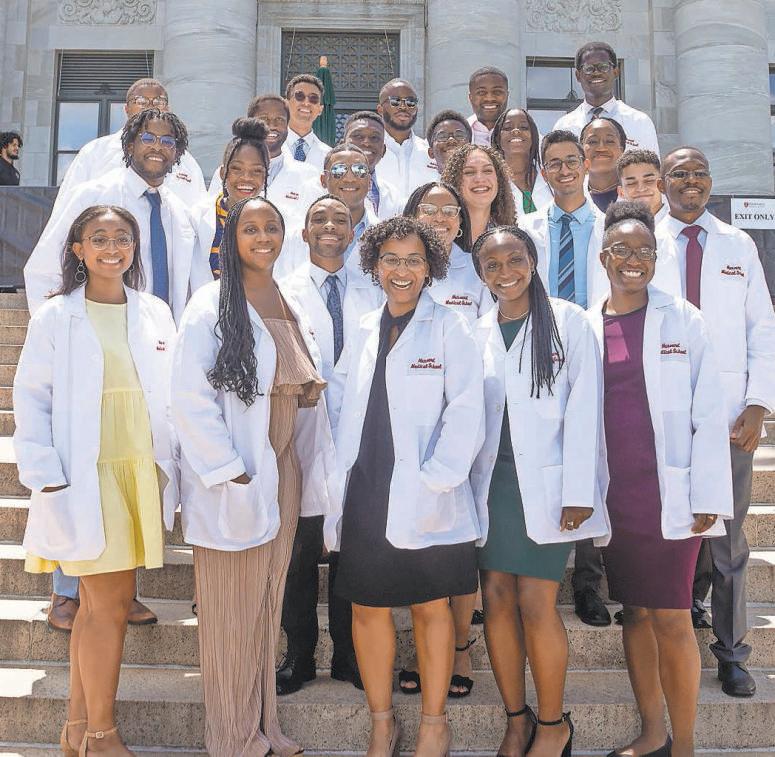
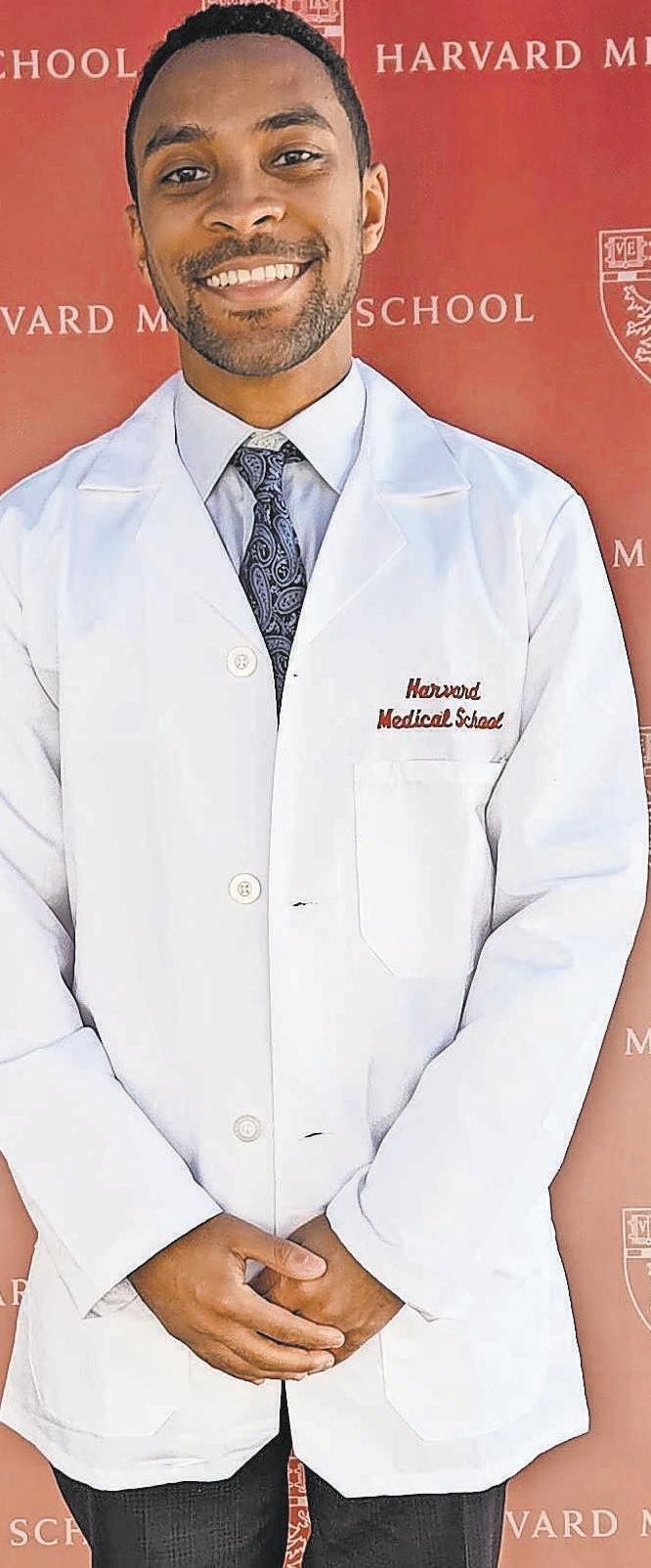
In 2017 Deajon-Jackson became HISD’s only Black National Merit Scholar before heading to Washington University in St. Louis where he graduated in 2021 Summa Cum Laude with a degree in biology with a neuroscience focus. Most recently Deajon-Jackson was busy working as a clinical research associate at the Yale School of Medicine. He was then selected to share that research with other current and aspiring medical professionals at the American Diabetes Association’s 2022 and 2023 national conferences.
Te Defender spoke with Deajon-Jackson about his journey just before he lef Houston for Harvard.
DEFENDER: How didDeBakeyhelp prepareyouforwhere you’regoingnow?
DEAJON-JACKSON: I don’t even know if I would’ve gone pre-med had I not gone to DeBakey High School. I think DeBakey prepared me so much. First, in terms of helping me understand what it meant to be a doctor, what it meant to be pre-med. We actually went into the hospitals and had sessions shadowing doctors. Tat’s where I frst kind of fell in love with the idea that I can actually see myself doing this. Ten once we got to the actual classes, especially with the STEM classes, I think they prepared me so much for my college career. My frst college general chemistry and biology classes, I distinctly remember thinking, “We did this at DeBakey. I took tests like this for years now. Tis is nothing.”
DEFENDER: Whatwas eight-year-oldJelani thinking about becomingwhen he grewup?
DEAJON-JACKSON: So, I went to Parker Elementary. Tey have a really good music program, and I did everything. I was in the choir. I was in the band. I played xylophone and triangle. I played piano. Now, how good I was at any of those… debatable. But that was my original intention. And I kind of fgured out, “I don’t know if I’m as good at this.” So, that’s when I kind of switched to more academic stuf in middle school, high school.
DEFENDER: What things atWashington University impactedyou most?
DEAJON-JACKSON: Te frst thing I think about when I think about WashU is the Urban Scholars Program. Tat’s one of the [school’s] scholarships. It’s targeted for mostly African-American students. Tose were the frst people I had contact with. Before any of the WashU orientations, we had our Urban orientation where we got all together, we talked, we laughed. I think that was one of the frst times that I was able to see that many smart, strong Black people at one place. And I think that was what gave me kind of the introduction of like, “Okay, I can ft in here. I can be here, I can succeed at Wash U.” And those connections in the Urban Scholar program lasted my whole four years. I still talk to them now. Even going from a mentee in my frst couple of years to being a mentor to the up-and-coming classes.
DEFENDER: The medical school application process;whatwasthatlikeforyou?
DEAJON-JACKSON: So you think that it is a grueling process and you don’t really know until you’re in it. But it’s basically like a yearlong process. Te application itself frst opens in late May, early June, and you don’t really hear back from all of your schools until like February, March of the following year. And if I were to give advice on it, kind of a general thing is don’t make it your whole life. Don’t invest all of your happiness, all of your hopes and dreams into this one specifc process, because it’s a doozy, it’s grueling, and there are ups and downs. You want to have something to anchor yourself, whether that’s friends, some other hobby, something. Don’t make this your whole life.
Dorion Renaud made a name for himself in reality TV, but the College Hill alum and model has come a long way from struggling with acne as a teen. Now, he’s an award-winning CEO of a popular skincare line.
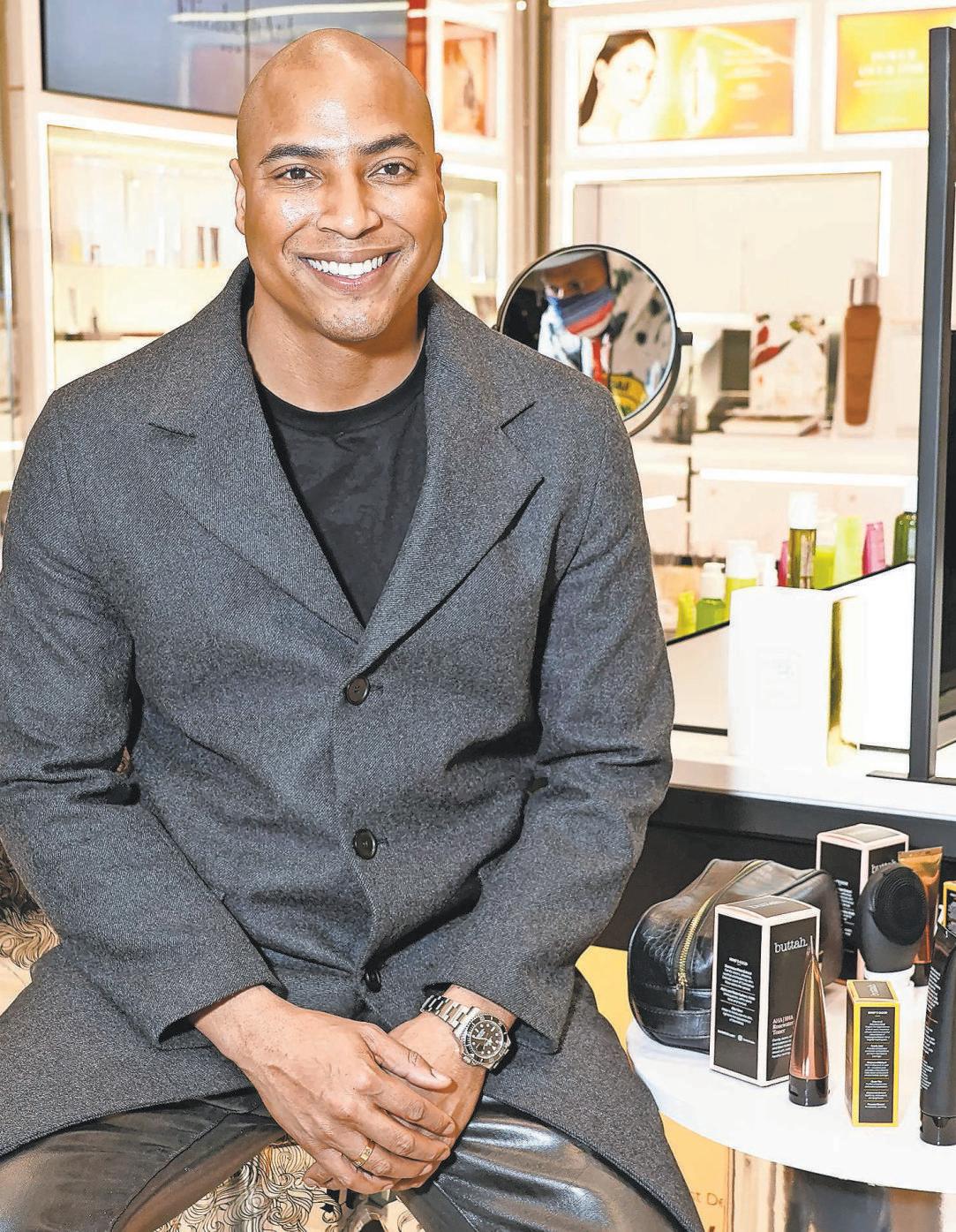
It was while working in the entertainment industry, trying to manage that acne, that the Beaumont native realized he couldn’t fnd good skincare products for melanated people. So in 2018, he founded Buttah Skin, a company that is now estimated to make $10 million in revenue this year, according to Forbes.
Renaud is proud of the fscal success he has experienced, but Buttah Skin is more than just another stream of income. His personal connection to the brand pushes him to continue to create products by and for Black people, giving customers confdence in their skin.
He talked with the Defender about his mission.
DEFENDER: Howdidyou even get introduced to skincare?
DORION RENAUD: In Beaumont, my dad had a barbershop and a shoe shop. So I grew up around self-care and really seeing a lot of men taking care of themselves and not being ashamed of it. My dad is almost 60 years old and in his era, it seemed like the brothers were really proud of going to the shoe shop and getting their shoes shined and going to the barbershop and getting their haircut. As I started matriculating in my career, I started modeling at about 18, doing television things and stuf like that. I started dealing with some real serious skincare issues in high school,
which led into my young adult life. And I could not fgure out what was going on. I didn’t know if it was ingrown hairs or acne. And then I realized there were a lot of the issues that Black people face, which is hyperpigmentation and, you know, dark spots and unevenness on our skin and just really wasn’t even skin. I didn’t think that there was really a solution for me afer trying so many diferent products. I ended up starting a skincare line for melanated people.
DEFENDER: It tookyou sixmonths to start Buttah.Howdidyou know what products to create?
RENAUD: I kind of just started creating some ideas. And Buttah was the frst name that came to me. I was just hoping to sell a few boxes or get them in a few people’s hands
because so many people had been asking me what I did to get my skin right. And it was a very simple routine - shea butter of the streets of New York and the Gentle Cleanser and the Vitamin C serum, which was something that I noticed a lot of my peers and Black people weren’t really using. So I started with what my routine was. And then I just kept expanding and expanding because the customers were so amazing and here we are.
DEFENDER: What doyou think it is that makesyourproduct so diferent?
RENAUD: We use ingredients that are
targeted to nourish our skin. Sometimes, when you go into the department stores and they have all of these beautiful lines out and sometimes you spend a lot of money on it and you get home and it’s not really for your skin type. What separates Buttah is that every kit is customizable. So just because you are a Black or a Brown person doesn’t mean that each skincare line is for you. So you can customize our kit by the moisturizer. We also combine entertainment with skincare and showing diferent shades and tones.
DEFENDER: It must be challenging to be a Blackman in the beauty industry?
RENAUD: Defnitely! When you think about beauty, oftentimes you don’t really think about a Black man. And whether that is trying to stand up for people that look like you or go in rooms, ofentimes when you’re the only person that looks like you, stand true to yourself. Another challenge is learning how to go from direct to consumer. And I think this is important ‘cause a lot of people have online businesses going from direct to consumer to retail. Tat was such a diferent transition, my company going from just selling online to now being global in retail stores. But, you know, being Black in beauty is a tough job. But what I’m doing and what other people are doing is opening doors for more people to continue to get into beauty.
DEFENDER: What isyouradvice to an entrepreneurwho has an idea likeyoudidandthey’rejustkindof hanging on to theirs?
RENAUD: Do your research in whatever it is that you want to do. Business research is so important, you know, to learn, especially as a Black entrepreneur, to learn everything that’s going on within your company, even if it’s not successful yet, to know how to get to that next level. Don’t just do it as a hobby and love it because it’s something you’re good at. Know the business of it, the ins and outs, the fronts and the back. And listen to the audience that you’re serving, not necessarily your friends, your cousins, your peers. Listen to those people that are looking for what you are bringing to the world.
What separates Buttah is that every kit is customizable. So just because you are a Black or a Brown person doesn’t mean that each skincare line is for you. So you can customize our kit by the moisturizer.
DORION RENAUD
FOUNDER & CEO, BUTTAH SKIN

Black August 2023 is the gift that keeps on giving. In the aftermath of the “incident” known ‘round Blackworld as the “Montgomery Boat Brawl,” as of Defender press time, three individuals have been charged by Montgomery police for taking part in the melee—and all of them are white.
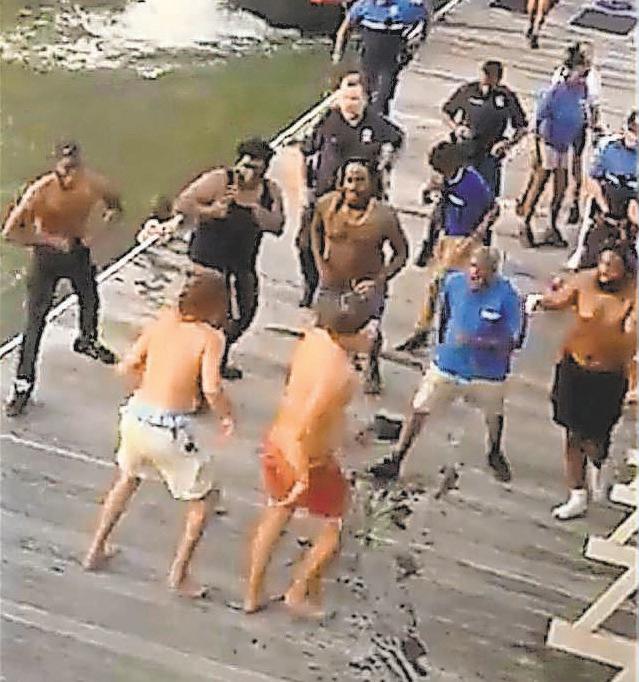
According to Montgomery Police Chief Darryl J. Albert, Richard Roberts, 48, was charged with two counts of third-degree assault. Allen Todd, 23, and Zachary Shipman, 25, were each charged with one such count. Albert said all three were connected to the private boat they refused to move when instructed by Damien Pickett, the Black co-captain of the Harriet II Riverboat, could dock in its designated and reserved spot.
One of the trio sucker-punched Pickett, and the others, along with additional unnamed co-conspirators joined in the assault.
One of the three, according to Albert, surrendered to authorities, while the other two perpetrators remain at large. Third-degree assault is considered a Class A misdemeanor in Alabama, punishable by up to a year in prison.
Montgomery Mayor Steven Reed said more charges may come.
“We should not become desensitized to violence of any kind in our community. Those who choose violence
will be held accountable by our criminal justice system,” Reed said.
Amazingly, no Blacks were charged after an altercation, at least according to Albert. However, videos show at least one Black man being handcuffed by police after baptizing multiple white people upside the head with a folding chair.
Moreover, multiple GoFundMe pages have been set up: one claiming to be for a Black man arrested at the scene seeking $25,000 to pay his bond; another seeking $250,000 to support Harriet II Riverboat members and passengers; and a third seeking $12,000 to support Pickett and those who came to his aid.
The Defender has not been able to verify the legitimacy of those GoFundMe pages. But what has been verified is Blackworld’s response to the Brawl, celebrating Pickett and his “Hat Signal;” 16-yr-old Aaren who jumped off the Harriet II and swam to aid Pickett, earning him online nicknames like “AquaMayne,” “Scuba Gooding Jr.” and “Swimzel Washington;” and just general Black unity. Pulitzer Prize-winning journalist Nikole Hannah-Jones pointed out why Blackfolk have derived such joy from the video, saying, “If you understand the history of Montgomery — one of the most prolific slave-trading cities in the U.S. turned brutally repressive apartheid regime after, and majority Black but JUST got its first Black mayor — it gives so much more perspective to this video.”

is heading into a season of increased expectations after the
had a chance to win the West division in the final week of last


 By Terrance Harris
By Terrance Harris
Durley Stadium was barely illuminated by some far-off campus lights on a recent Saturday night, but the energy on Texas Southern’s practice field could be felt and seen.
Players were flying around making plays and talking it up on both sides of the football. It’s quite obvious these Tigers are ready to make a statement.
They are ready to make history by bringing home the SWAC championship for the first time since 1968 and for the first time since the storied conference split into two divisions.
“Go’on and get your popcorn,” said defensive end Michael Atkins. “It’s about to be a movie.”
For the first time in over a decade, there seems to be a buzz around the Tigers’ program as expectations have started to trend in a winning direction. TSU has been picked to finish third in SWAC West behind Southern and Alcorn State, which is a huge jump from the usual sixth-place spot the Tigers normally occupy in the six-team division when it comes to preseason predictions.
TSU coach Clarence McKinney isn’t moved at all by the increased expectations surrounding his program this season.
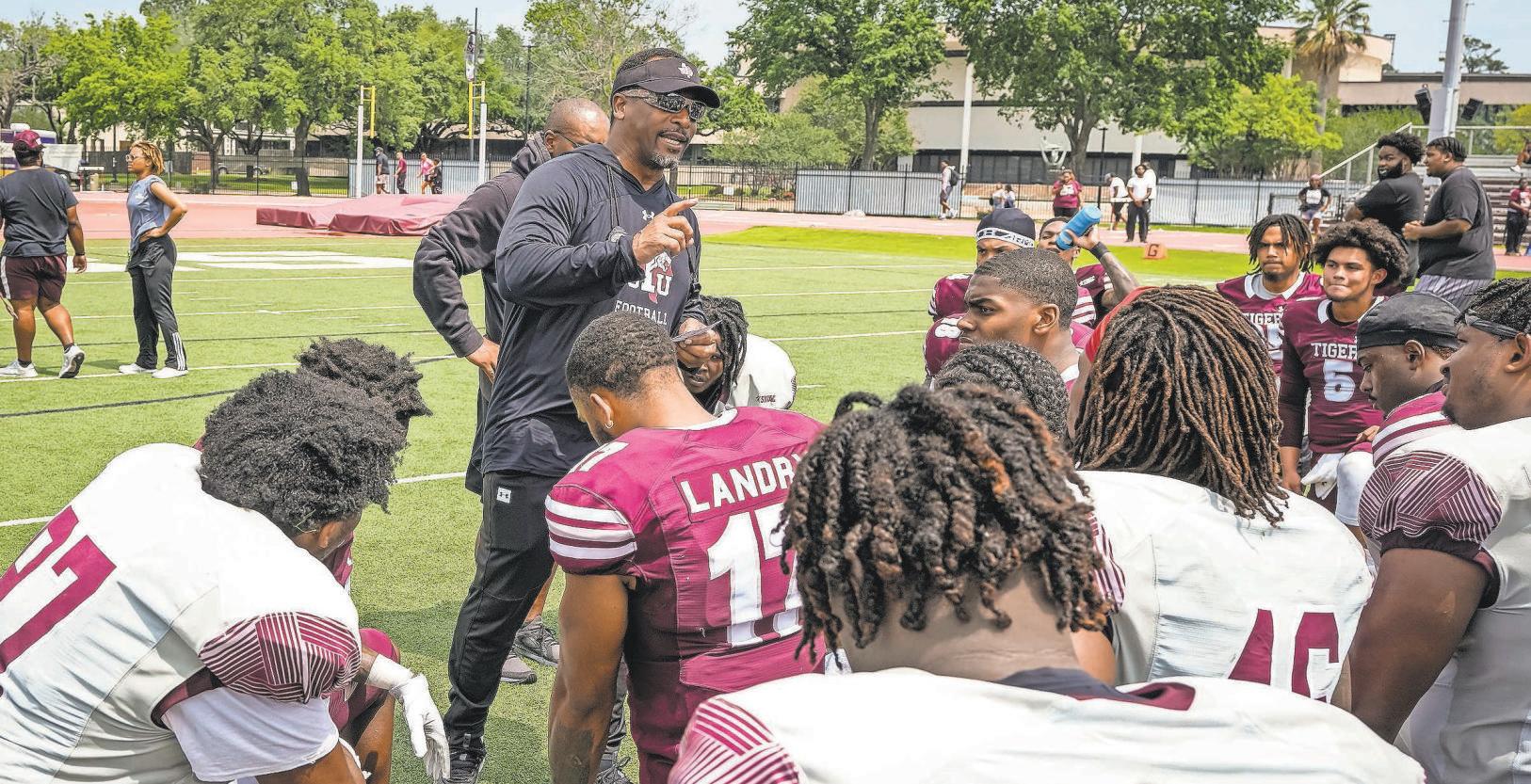
“It really has no bearing or effect on how we see ourselves because we know when we were being picked at the bottom of the barrel, we know we weren’t the worst team in the league because we know the work that we put in,” said McKinney, who is entering his fifth season at the helm. “They picked us third in the West and we feel like we are better than
third in the West.
“So, expectations outside of the program may be new but the expectations within the program have always been to win the West and give ourselves an opportunity to win the SWAC and play in the Celebration Bowl and maybe win that, too. Those are our goals every year.”
The increased outside expectations are a result of the number of proven talent the Tigers have returning, including junior quarterback Andrew Body, who is entering his third year as a starter and is considered one of the premiere quarterbacks in the SWAC.
The Tigers also changed the narrative after the way they finished last season, winning four of the final six games and entered the final week of the season with a chance to win the SWAC West and earn a berth into the conference championship game before falling to Alabama A&M, 24-20, in the regular-season finale.
While McKinney says he and his coaching staff have never discussed last season in the context of showing how close the Tigers are to competing for a championship, Atkins says the way the season ended has definitely been in the back of the players’ minds.
“It has been a motivator for us. We dropped in the last eight minutes to the SWAC Championship and we had prepared for that and we were fighting for it, trying to make school history,” said Atkins, who was named to the Preseason All-SWAC Second Team. “We did make school history, but we didn’t do enough. We want the SWAC Championship and even
more. We want the Celebration Bowl. We want all of it.
“Just coming up short last year, it was a hard pill to swallow. But it just added fuel to the fire for us to come back this year and go at it.”
There is no denying that the Tigers are more talented and experienced than they’ve been during McKinney’s tenure. Offensively, there are players like wide receiver Derek Morton, running back Jacorey Howard and offensive lineman Mehdi Torrence surrounding Body. Former four-star receiver Quadarius Davis, who was offered scholarships by the likes of Texas and USC before choosing Kansas coming out of Skyline in Dallas, has been added to the mix after spending last season at Jackson State.
Defensively, Everett Todd has come aboard as defensive coordinator after eight stellar seasons at Grambling State. The Tigers have added bodies to plug holes with experienced defensive tackles Elinus Noel III and Thurman Rayborn coming in to provide some strength up front. And Xavier Player could be a big addition to the secondary after spending time at Oklahoma State and UTSA.
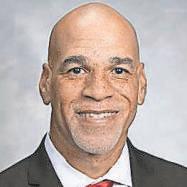
“Ain’t no doubt about it,” McKinney said when asked if this is the team he has been building towards. “The day I got here, I wanted to build it with high school guys and develop them. I think we’ve done that as a staff. We’ve recruited pretty well, brought in some talented guys and we’ve developed them within our system. Guys have grown. This is just what we envisioned a few years ago.”
WNBA star and Houston native Brittney Griner returned to action this past weekend after missing three games to deal with some mental issues. Griner, the Phoenix Mercury center, had 22 points, six rebounds and four assists during a 97-91 loss to Seattle in her return to action. “You can’t plan for when you might need some time,” Griner said when asked if the break she took was planned coming into the season. “I just want to shout out the Phoenix Mercury organization. From the jump, they were there for me, making sure I was good, letting me know that at any moment if I needed some time off, I could do that.”
It’s only been a couple of weeks of training camp, and firstyear Texans coach DeMeco Ryans has quickly gained the reputation of being a straight-shooter with his players. That’s both good and bad. And Ryans is perfectly fine with that. “I am a coach that’s going to shoot it straight to the guys. These guys have a limited amount of time in their careers, and we don’t know how long their career will be,” Ryans said. “So for me, I’m not going to sugar coat it to a player to make him feel good. I’m going to tell players the truth whether they like it or not because I know in the end, they’ll respect me more by telling them the truth. And that’s the type of coach I am.”
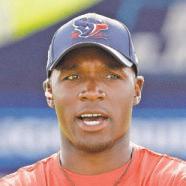
Prairie View formally introduced Anton Goff as the new athletic director on Aug. 10 after announcing his hiring last week. Goff was most recently at Northern Illinois where he had served as a senior associate athletic director. But Goff has also served as an athletic director at St. John’s, Hartford and Bowie State. He is replacing Dr. Donald Reed, who was fired last fall. His first official day on the job is Aug. 28.
Not shying away from increased expectations
Te Harris County Precinct One Street Olympics has been crowning young champions for over 37 years. Whether in kickball, track and feld or basketball, local youth have been able to compete in a wide range of physical activities. Tis year the Street Olympics focused on inspiring youth to have fun while learning skills they could take to the future workforce.
“We have a spelling bee, poetry and other components that we engage kids throughout the summer in meaningful ftness activities as well as mental activities to teach and identify leadership opportunities,” said Executive Director of the Harris County Precinct One Street Olympics, Jose Rivera.
Johnny Molock, IT Director for Bridging the Digital Divide, was on hand hoping to get more minorities active in fying drones. Jobs in this feld can range up to $150,000 per year with only three months of training.
Gabriel Reed, a sixth grader who attends Lawson Middle School, aspires to become an aviation pilot. He began working with the Bridging the Digital Divide organization while at a camp at his previous school, Windsor Village.
“He was an outstanding student. He few the drones well. He also participated in our simulators and learned how to edit videos, while at the camp,” said Molock.
To be able to fy a drone there are two types of licenses one could acquire, recreational or commercial. Te recreational license allows you to fy a drone recreationally. Tis license typically takes about an hour to receive. However, if one wants to fy commercially, that course usually takes about three months. Bridging the Digital Divide was on hand allowing participants to test and receive their recreational licenses.
Isaiah Riggs, a junior at Jones High School, was the frst to come and get certifed while at the Street Olympics.
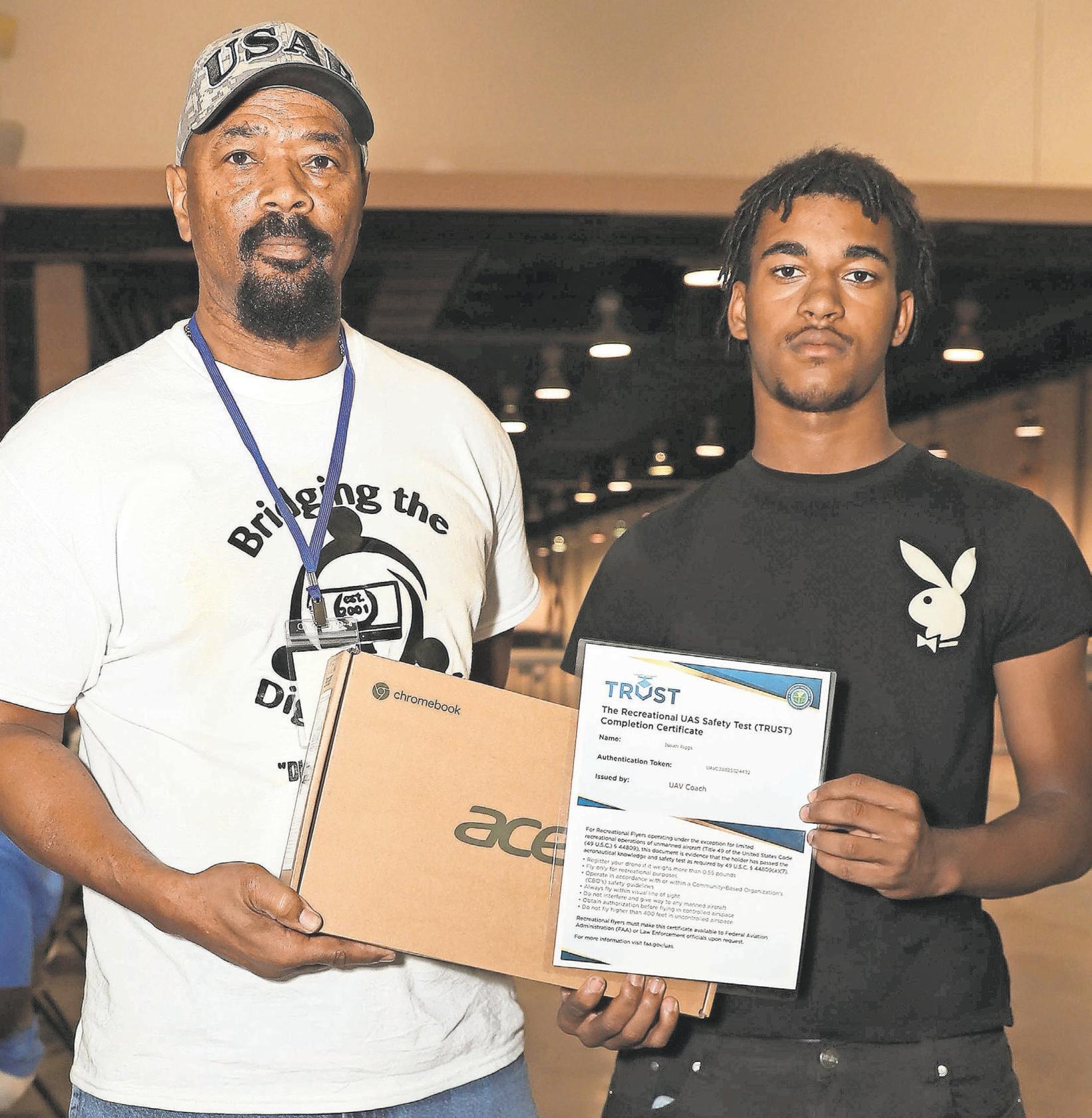
“I’m always the frst in everything,” said Riggs. “I saw a bunch of big drones and I thought to myself, cool, what if I fy these? Tey told me that this is easy money when I get older, so this serves as a backup plan for basketball. If I get injured, I can always turn to this. I’ll fy for commercials or test other people’s drones for them. I see it as
easy money for me to take care of myself and my future family.”
Hundreds packed inside or NRG Arena and tested their skills. Many walked away learning new skills and being exposed to more opportunities. Te Harris County Street Olympics has come to a close this year but has planted that seed in many local youth, that they can become anything they put their mind to.
Only 3% of drone operators are women and roughly only 7% are Black or Brown. So, we are trying to make sure that minority men and women get the information and take advantage of the opportunity."
JOHNNY MOLOCK IT DIRECTOR, BRIDGING THE DIGITAL DIVIDE

One in eight women will develop breast cancer during her lifetime. That’s why where you go for your annual breast screening is so important.
Choose MD Anderson Cancer Center for your next mammogram, and you’ll receive a 3D mammogram interpreted by dedicated experts providing results you can trust — from the start.
Our team is exclusively focused on breast imaging and includes fellowship-trained breast radiologists and compassionate nurse navigators committed to providing the highest level of expertise and care. In most cases, patients will receive their imaging results the same day.
Schedule your mammogram today for the peace of mind you’ll only get from MD Anderson.